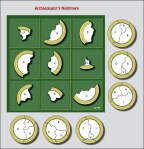I know it makes a lot of teachers nervous/sick-to-the-stomach, but I absolutely LOVE communicating with students through Facebook. Yes, I Facebook with students. In fact, I accept every request they send my way, because it is an incredible way to take seriously what I believe about relationships and learning.
I bring it up, because I had a fantastic exchange with an Algebra 2 student yesterday, and it couldn’t have happened if I refused or was prohibited from using Facebook with my students.
* * *
An Algebra 2 student of mine sent me a message last night saying, “Those Vi Hart videos are pretty crazy, The doodle games can get so absorbing.” I of course loved this for lots of reasons. Math was seeping its way into his life, and he was spending his own time thinking mathematically and scratching the math itch. This, more than anything, in my opinion, is the critical trait present in the lives of mathematical thinkers.
We started talking about this video, my personal favorite, all about different kinds of stars. I said something about how all stars with a prime number of points come in one piece, and he said “something i was thinking about with stars that might not go anywhere, what happens if you arrange the dots that map points into a shape other than a square or a circle? do the shapes change or do they just get a bit warped?” A question of his own – the sure sign of a mathematically active brain.
I spent a ton of time thinking about this last Spring, so I started telling him all about my research and a few of the intriguing questions I worked on. In fact my own weird path led me to a remarkable fact about triangular numbers in modular rings, and that somehow led me to write some pieces for a DIY music box I bought last year. I played it for our class one day, and he was amazed to hear the mathematical design. For me, this is “math in the real world.”
We went on for a while talking our way through a few things. He was clearly ready to play with the ideas on his own, so I tried to give him just enough to fuel his curiosity and send him on his way. Here’s my favorite part: “yeah okay i feel like theres a piece of this that im missing, and with the increasing skipping of points when do you stop? is the star closed or composed of polygons.” I didn’t have to wait for our next class to chat (something I can never find enough time for anyway). I just went to his profile page, hit record on the webcam, and drew him a few diagrams!
[Have you noticed his grammar and spelling were less than impeccably proper? Can you think of any reason why I should care at all?! I can’t. Not when we’re in the middle of great math thoughts.]
This whole conversation was a perfect lead-in to the Mathematical Art seminar I’m leading with Justin Lanier and two other colleagues starting next week that this student will be taking. Talk about bringing motivation and interest to class. He also posted a picture of his own “string art” drawing earlier this week (deeming school Facebook worthy), so he’s clearly ready to play around with mathematical projects of his own. I’m thrilled and honored to mentor that process, wherever that may occur.
* * *
My school puts the relationship between teacher, student, and subject at the center of its philosophy, so I feel rock solid about stories like this. In fact, I wonder if it gets any better.
We have a policy about email that says teachers and students are free to communicate this way, but feedback on classwork should come during class time. To me, handing back a piece of paper with written comments seems rather equivalent to emailing it, but whatever. I suppose I get it. That’s fine.
Luckily, our policies don’t yet preclude me from interacting with students through other social media, though I know some administers are worried about having “official classwork” populate there and would probably wring their hands at me. I’ve heard a new social media policy is coming down the pipe, but I’m just praying my students and I can continue to connect as successfully as we have.
We are friends. Not the kind that enable your bad habits or exist for status in the often uncomfortable school social scene. We’re friends with shared interests, and Facebook is where we show them off and connect around them.
I’m not on Facebook to gossip or read whiney statuses or relish in school drama. I’m there to share content. Posts with real substance. Quotes worth reading. Pictures worth seeing. Links worth clicking. Ideas worth thinking about. The kind of content worth filling your life with. This is what a life of learning is about.
By interacting with students through Facebook, I can help them fill their life with good stuff and play the role of their intellectual friend – the one who challenges them and points to great stuff they can explore on their own. Isn’t that teaching?
I just hope whatever policy comes down the pipeline lets me continue to do what I’m already doing well – making real connections with students around content.





